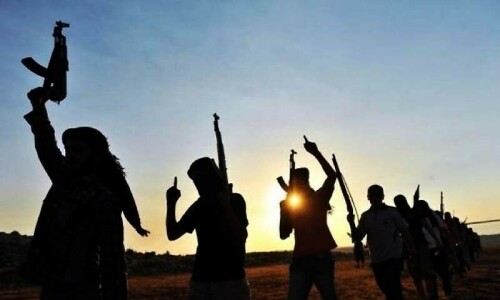
ISLAMABAD: Pakistan saw a significant decline in suicide attacks in 2011 and their number went down to 45 from 68 in 2010 and 87 in 2009. According to the ‘Security Report 2011’ of Pakistan Institute for Peace Studies (PIPS), 676 people, mostly civilians, were killed and 1,462 injured in suicide attacks last year.
More than half of these attacks (27) took place in Khyber Pakhtunkhwa (KP), claiming the lives of 449 people, says the report which will be formally released on Wednesday.
It says 2,985 incidents of violence were reported in 2011, compared to 3,393 in 2010 and 3,816 in 2009, a decline of 12 and 22 per cent, respectively.
Interestingly, the report also puts into the category of violent incidents the operations carried out by security forces against militants in different parts of the country, particularly in tribal areas, and incidents of cross-border attacks.
“Casualties in violent incidents also went down from 10,003 in 2010 to 7,107 in 2011, a decrease of 29 per cent. The number of injured declined from 10,283 in 2010 to 6,736 in 2011, a decline of 34 per cent,” the report says.
Terrorist attacks carried out by militants and nationalist insurgents as well as sectarian-related incidents of violence claimed numbered 1,966 and claimed 2,391 lives and injured 4,389 people in 2011. The Federally Administered Tribal Areas (Fata) suffered 675 terrorist attacks, the highest for any region of the country during the year.
Insurgency-hit provinces of Balochistan and KP faced 640 and 512 terrorist attacks, respectively, in 2011. Fifty-eight attacks were reported in Karachi and 21 in other parts of Sindh, 30 in Punjab, 26 in Gilgit-Baltistan and four in Islamabad. No terrorist attack, according to the report, was reported from Azad Kashmir.
The highest number of casualties in terrorist attacks in 2011 was reported from KP where 820 people were killed and 1,684 wounded, followed by Balochistan (710 killed and 853 injured) and Fata (612 killed and 1,190 injured). A significant number of casualties in terrorist attacks were also reported from Punjab and Karachi.
According to the report, security forces launched 144 attacks on militants in various parts of KP and Fata, killing at least 1,016 militants. A total of 279 militants surrendered to the authorities while 4,219 were arrested. A few of them were put on trial, the report says.
The report attributes the fall in conflict-related casualties largely to military operations in tribal areas and KP and to fewer suicide bombings and drone strikes in 2011.
The overall incidence of sectarian violence declined by nine per cent — from 152 incidents in 2010 to 139 in 2011. However, unlike in 2010, incidents of sectarian violence were reported from several cities and towns, claiming 79 lives in Karachi, 80 in Quetta, 50 each in Kurram Agency and Dera Ghazi Khan and 26 in Mastung.
In 84 incidents and clashes along the country’s borders, 261 people were killed and 206 injured in 2011. In 75 US drone attacks in 2011, 557 people were killed and 153 injured.
On the political and administrative front, the report says, the Fata reforms package was a positive development, although implementation remained lacking. The compensation mechanism for civilian victims of terrorist attacks remained a critical issue and hundreds of schools in Fata have remained closed since 2009.
The report highlights the absence of effective political means to address the situation in Balochistan. It says: “The tribal guerilla warfare of earlier years had morphed into a robust urban insurgency in the province. Enforced disappearances, targeted killings and recovery of bullet-riddled bodies from across the province continued.”
The repeated breakout of ethno-political and sectarian violence and the consistent failure to restore peace in Karachi and the ability of terrorists to infiltrate government departments and security agencies have been pointed out as critical concerns.
“Reforms with a view to bring those involved in acts of terrorism and violence to justice in an expeditious manner, improved prosecution, an effective witness protection programme, and rehabilitation of detained militants” have been highlighted as areas in urgent need of improvement.
The report says that despite many challenges Pakistan faced on account of terrorism, it is yet to develop a comprehensive counter-terrorism strategy.
The focus has been on countering insurgency in tribal areas, mainly through the use of military force and raising local communities to confront the militants.
While development was claimed to be a key pillar of the government’s counter-insurgency campaign, a proper development strategy remained missing, the report adds.
The accompanying tables give a complete picture of the security situation in the country in 2011.














































